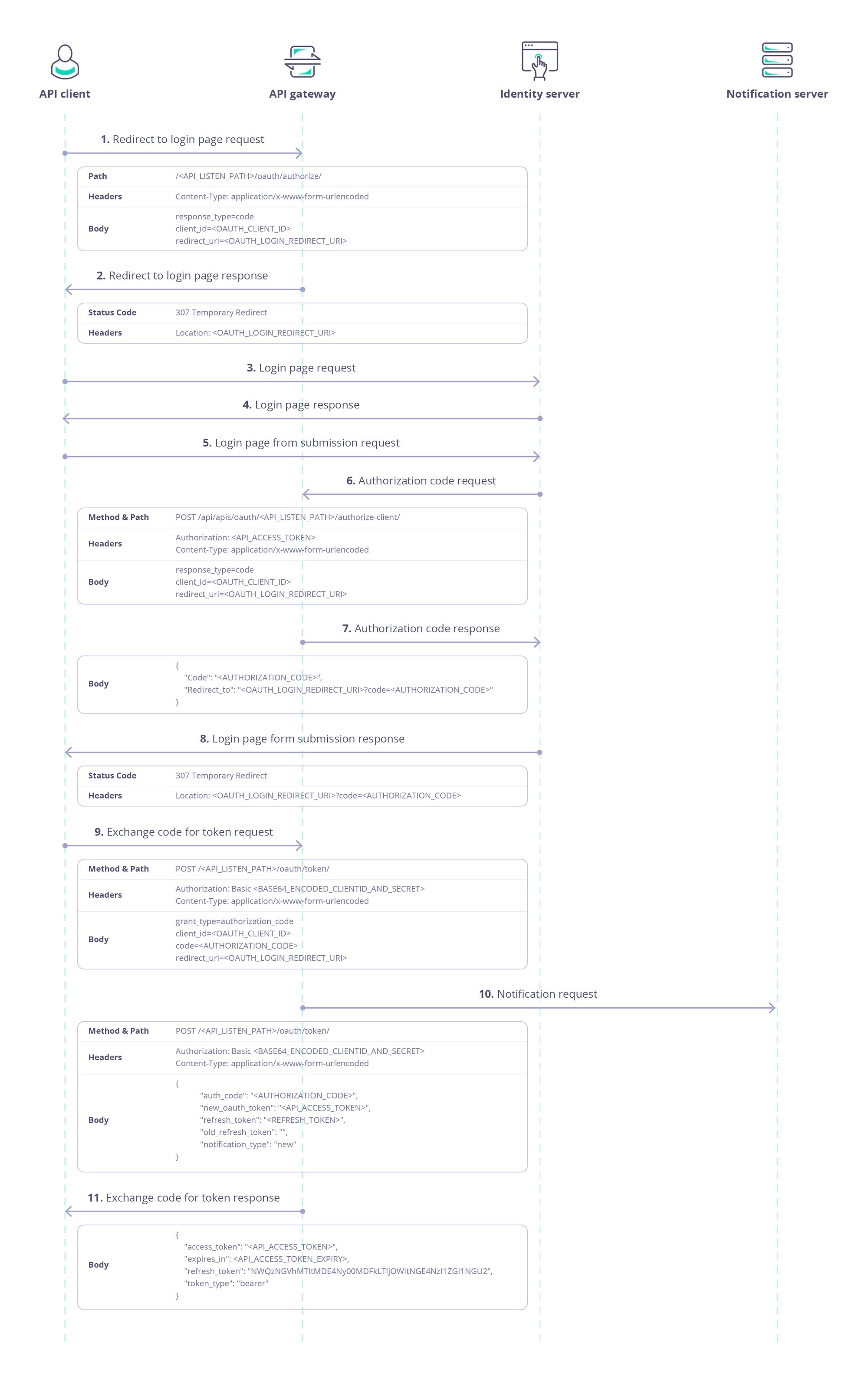Authorization Code Grant Type
This process requires three steps:
- Redirect to a login page
- Request an authorization code
- Exchange code for a token
Redirect to a login page
curl -X POST \
https://tyk.cloud.tyk.io/oauth-api/oauth/authorize/ \
-H 'Content-Type: application/x-www-form-urlencoded' \
-d 'response_type=code&client_id=ed59158fa2344e94b3e6278e8ab85142&redirect_uri=http%3A%2F%2Fexample.com%2Fclient-redirect-uri'
| Request | Value |
|---|---|
| Method | POST |
| URL | Uses the special OAuth endpoint /oauth/authorize appended to the API URI e.g. https://<your-gateway-host>/<your-api-listen-path>/oauth/authorize. |
| Header | Value |
|---|---|
Content-Type |
application/x-www-form-urlencoded |
| Data | Value |
|---|---|
response_type |
code |
client_id |
The OAuth client id, in this case ed59158fa2344e94b3e6278e8ab85142. |
redirect_uri |
The OAuth client redirect URI, in this case http://example.com/client-redirect-uri and must be URL encoded e.g. http%3A%2F%2Fexample.com%2Fclient-redirect-uri. |
Response
Response generates a 307 Temporary Redirect to the Oauth client redirect URI. It is expected that this location will be capable of authenticating the user then using the data forwarded to it as part of the redirect to request an authorization code.
Request an authorization code
This request should be made from the 3rd party authentication server.
curl -X POST \
https://admin.cloud.tyk.io/api/apis/oauth/25b854d3fdc84703679f49ea33981aa9/authorize-client/ \
-H 'Authorization: 70c3d834d46a4d6076e1585b0ef2e93e' \
-H 'Content-Type: application/x-www-form-urlencoded' \
-d 'response_type=code&client_id=ed59158fa2344e94b3e6278e8ab85142&redirect_uri=http%3A%2F%2Fexample.com%2Fclient-redirect-uri'
Note
Because this example uses Tyk Cloud it uses the API id in the URL. For all other scenarios (e.g. On-Premises) you should use the API listen path instead e.g. https:/
Note
The Tyk Gateway also exposes an equivalent Gateway API authorization endpoint (/tyk/oauth/authorize-client/). In some scenarios, for example where access to the Dashboard API from the authentication server may be restricted, the Gateway API can be used instead.
| Request | Value |
|---|---|
| Method | POST |
| URL | Uses the Dashboard API client authorization endpoint /authorize-client/. |
| Header | Value |
|---|---|
Authorization |
The Dashboard user credentials, in this case 70c3d834d46a4d6076e1585b0ef2e93e. |
Content-Type |
application/x-www-form-urlencoded |
| Data | Value |
|---|---|
response_type |
code |
client_id |
The OAuth client id, in this case ed59158fa2344e94b3e6278e8ab85142. |
redirect_uri |
The OAuth client redirect URI, in this case http://example.com/client-redirect-uri and must be URL encoded e.g. http%3A%2F%2Fexample.com%2Fclient-redirect-uri. |
Response
Response provides the authorization code as code and the redirect URL as redirect_to. It is expected the 3rd party authentication server will redirect the user to the redirect URL.
{
"code": "EaG1MK7LS8GbbwCAUwDo6Q",
"redirect_to": "http://example.com/client-redirect-uri?code=EaG1MK7LS8GbbwCAUwDo6Q"
}
Exchange code for a token
The client application uses this request to exchange the authorization code for an API token. Note that codes are single use only, so cannot be reused.
curl -X POST \
https://tyk.cloud.tyk.io/oauth-api/oauth/token/ \
-H 'Authorization: Basic ZWQ1OTE1OGZhMjM0NGU5NGIzZTYyNzhlOGFiODUxNDI6TUdRM056RTJNR1F0WVRVeVpDMDBaVFZsTFdKak1USXRNakUyTVRNMU1tRTNOMk0x' \
-H 'Content-Type: application/x-www-form-urlencoded' \
-d 'grant_type=authorization_code&client_id=ed59158fa2344e94b3e6278e8ab85142&code=EaG1MK7LS8GbbwCAUwDo6Q&redirect_uri=http%3A%2F%2Fexample.com%2Fclient-redirect-uri'
| Request | Value |
|---|---|
| Method | POST |
| URL | Uses the special OAuth endpoint /oauth/token appended to the API URI e.g. https://<your-gateway-host>/<your-api-listen-path>/oauth/token. |
| Header | Value |
|---|---|
Authorization |
Basic authorization, using the client id and client secret of the OAuth client base64 encoded with colon separator. E.g. <oauth-client-id>:<oauth-client-secret>, in this case ed59158fa2344e94b3e6278e8ab85142:MGQ3NzE2MGQtYTUyZC00ZTVlLWJjMTItMjE2MTM1MmE3N2M1, which base64 encoded is ZWQ1OTE1OGZhMjM0NGU5NGIzZTYyNzhlOGFiODUxNDI6TUdRM056RTJNR1F0WVRVeVpDMDBaVFZsTFdKak1USXRNakUyTVRNMU1tRTNOMk0x. |
Content-Type |
application/x-www-form-urlencoded |
| Data | Value |
|---|---|
grant_type |
authorization_code |
client_id |
The OAuth client id, in this case ed59158fa2344e94b3e6278e8ab85142. |
code |
The authorization code (code) provided in the response to the previous request, in this case EaG1MK7LS8GbbwCAUwDo6Q. |
redirect_uri |
The OAuth client redirect URI, in this case http://example.com/client-redirect-uri and must be URL encoded e.g. http%3A%2F%2Fexample.com%2Fclient-redirect-uri. |
Response
Response provides the token as access_token in the returned JSON which can then be used to access the API:
{
"access_token": "580defdbe1d21e0001c67e5c2a0a6c98ba8b4a059dc5825388501573",
"expires_in": 3600,
"refresh_token": "NWQzNGVhMTItMDE4Ny00MDFkLTljOWItNGE4NzI1ZGI1NGU2",
"token_type": "bearer"
}
Notification
This grant will generate a notification, sent from the Gateway to the OAuth Notifications URL, which contains the OAuth Notifications Shared Secret as a header for verification purposes.
{
"auth_code": "EaG1MK7LS8GbbwCAUwDo6Q",
"new_oauth_token": "580defdbe1d21e0001c67e5c2a0a6c98ba8b4a059dc5825388501573",
"refresh_token": "NWQzNGVhMTItMDE4Ny00MDFkLTljOWItNGE4NzI1ZGI1NGU2",
"old_refresh_token": "",
"notification_type": "new"
}
Sequence Diagram

